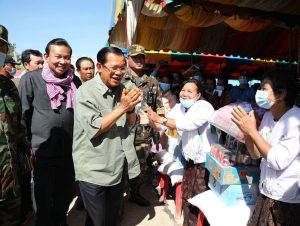Today marks 29 years since the signing of Cambodia’s Paris Peace Agreements, a landmark international accord that continues to resonate through the country’s politics – if not always for the right reasons.
The October 23, 1991 agreement was the product of long and painstaking negotiations. Its main purpose was to end the civil war that had raged for more than a decade between the Soviet- and Vietnam-backed Cambodian government and three rebel factions backed by China, the United States and the Association of Southeast Asian Nations (ASEAN).
The treaty paved the way for the United Nations Transitional Authority in Cambodia (UNTAC), a peacekeeping mission that essentially governed the country in 1992-93, during which time it was tasked with disarming the factions, returning refugees to their homes and holding free elections. Reflecting the zeitgeist of the time – a period of giddy liberal optimism that attended the collapse of the Soviet Union – the agreement also pledged to turn a poor, conflict-torn nation into a liberal democracy, where human rights would be respected and defended.
Ever since, as long-ruling Prime Minister Hun Sen has ruthlessly strengthened his grip over the democratic institutions implanted by UNTAC, the promise of Paris has become deeply entangled with the country’s domestic politics. For opposition figures like Sam Rainsy, who have spent years trying to end the iron-fisted rule of Hun Sen, the accord has remained a rallying cry for international support. To mark the October 23 anniversary, exiled members of the now-banned Cambodia National Rescue Party (CNRP), including Rainsy, put out a statement framing the country’s predicament in stark terms: “Message to Signatories of Paris Peace Accords: Act now or lose Cambodia forever.”
The statement went on to accuse Hun Sen’s Cambodian People’s Party (CPP) government of violating the terms of the Paris Agreements and the Cambodian constitution that it helped create by permitting the Chinese military to operate from Cambodian soil. In July 2019, the Wall Street Journal claimed that the two countries had signed a secret agreement granting China access to the Ream Naval Base on the Gulf of Thailand. Similar suspicions also attach to a large Chinese-backed tourism development further up the coast. The Cambodian government has strenuously denied the reports.
The CNRP statement finished with a call for the U.S. and other Western powers to impose harsh sanctions on Hun Sen’s allies, and “to immediately convene a meeting among key signatories to review the shortfalls in the implementation of the 1991 Paris Peace Agreements.”
For the CPP, meanwhile, the Paris Agreements have been subsumed within the party’s own foundational myths, as evidenced by remarks that Hun Sen made on the anniversary of the agreement. Hun Sen argued that Paris would never have happened were it not for the meetings between he and Prince Norodom Sihanouk that took place in France in 1987. He also pointed out (rightly) that the Paris Agreements failed the bring Cambodia’s civil war to an end, something that he credited to his own government’s offensives and amnesties in the late 1990s – a policy that has since been canonized by CPP historiography as the “win-win policy.”
“Were there no win-win policy that I formulated, issued and lead with participations from [all] stakeholders and the Cambodian people, there would not be peace as it is now,” Hun Sen said. “I hope that politicians and people will judge the country’s development based on these historic facts.” Just as Hun Sen made his remarks, protests organized to mark the anniversary outside the U.S. and Chinese embassies in Phnom Penh were being broken up by force.
The desire to resist outside democracy promotion efforts, and his opponents’ attempt to harness and encourage them, is one of the main reasons for Hun Sen’s recent embrace of a rising China. While Beijing was a signatory of the Paris Agreements, its government never fully embraced the attempt to remake Cambodia as a democracy, and Chinese largess has now given Hun Sen an escape valve from Western pressure to enact democratic and good governance reforms.
The real provenance of the Paris Peace Agreement was more mundane. In 1991, Cambodia had been at war for most of its history as an independent nation, destabilized by the wider struggle between warring superpower blocs. This was a period in which Cambodia’s fate had been determined to a significant extent by forces beyond the country’s control.
In this sense, the main political purpose of the agreement was to remove Cambodia from the international agenda, and allow the country to recover from a generation of upheaval and conflict, under an internationally recognized government. As one American official involved with the peace talks told me in 2012, “The Paris Agreements essentially established a framework by which politics could be put back into Cambodian hands.”
In the end, Paris succeeded in transforming Cambodia into neither a democracy, nor a liberal state. Instead, it turned democratic and liberal rhetoric into a battleground of struggle – just one more weapon to be deployed in domestic political struggles. In a statement posted on Facebook to mark the treaty’s anniversary, the U.S. Embassy in Cambodia hailed the Paris Agreements “as an inspiring example of what can be achieved when countries come together to pursue common and noble causes.” The other, less optimistic, view is that it illustrates the limits of such efforts.

































